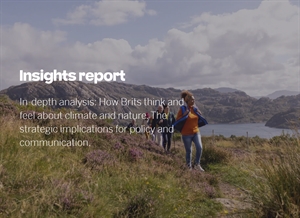Large majority of Britons think net zero will be good for the UK
Wed 10 September 2025
View all news

Significantly more members of the public support having a net zero target than oppose it according to new research by think tank More in Common and Climate Outreach. However the report show high levels of disillusionment with politics and concerns about the impact of net zero on the cost of living.
The number of people who think the UK’s net zero target will be good for the country outnumbers those who think it will not by 48% to 16% based on polling of 7,000 people.
More of those polled believe that the shift to clean energy has been fair than say it has been unfair and high levels of pride are expressed in new industries such as offshore wind.
Voters remain concerned, however, about the personal cost of achieving net zero and, overall, levels of support for the target have declined over the last year in the face of attacks from some political parties and since the election of a climate-denying administration in the United States.
Responding to the report, Secretary of State for Energy and Net Zero, Ed Miliband MP said: “Those who seek to divide communities with climate disinformation will not win because they do not represent the interests or values of the British people.”
Commenting on the research Climate Outreach said that “politicians are not well trusted to speak about climate” and that part of the reason for falling levels of support isn’t the message but the messengers.
Alongside the report, Climate Outreach has published a new 'Communications Toolkit' which covers how to talk about different issues, including net zero and climate adaptation.
The toolkit suggests a short list of 'Dos and Don'ts' when talking about net zero for organisations and companies involved in the transition:
Do emphasise that we want to unlock a decent future for our country and communities, not that we want to ‘secure net zero.’ We need to talk much more about the better future we’re trying to create.
Do relate it to people’s lives and highlight tangible benefits. Focus on what net zero means in concrete terms — whether it’s cleaner air, warmer homes, good jobs, better health and wellbeing.
Do be clear that we can be proud of what’s being done: from clean energy to protecting nature and wildlife, we’re already on the case.
Don’t attempt to ‘defend’ net zero by using statistics and appealing to scientific authority.
The 'Britain Talks Climate & Nature 2025' report and communications toolkit are available at this link.
Related Links
< Back to news list